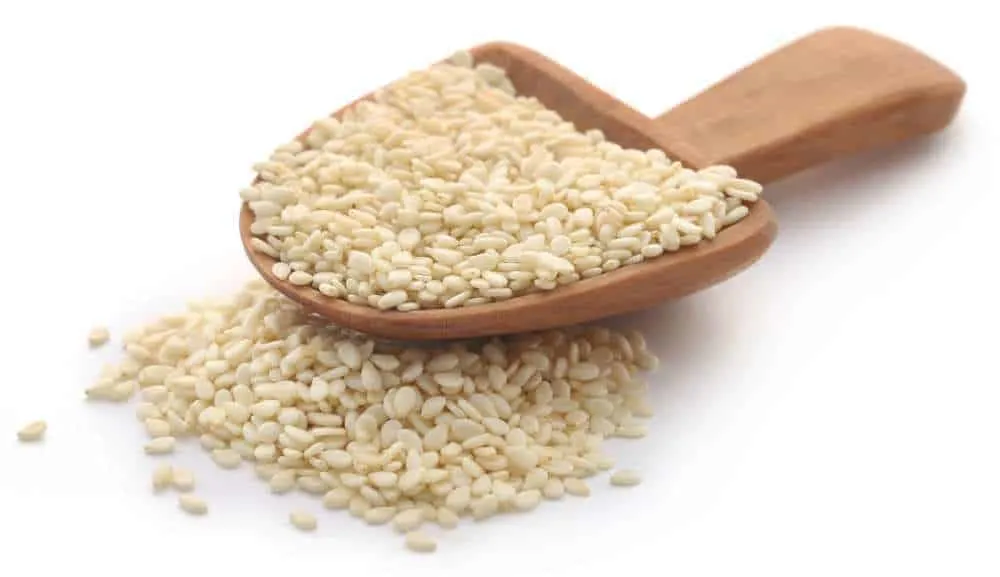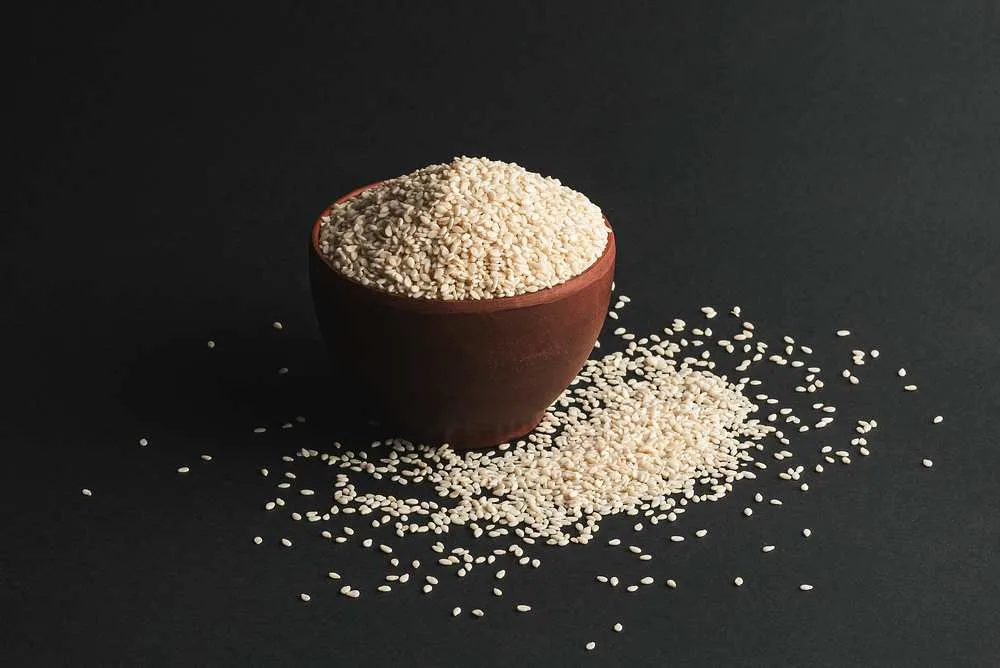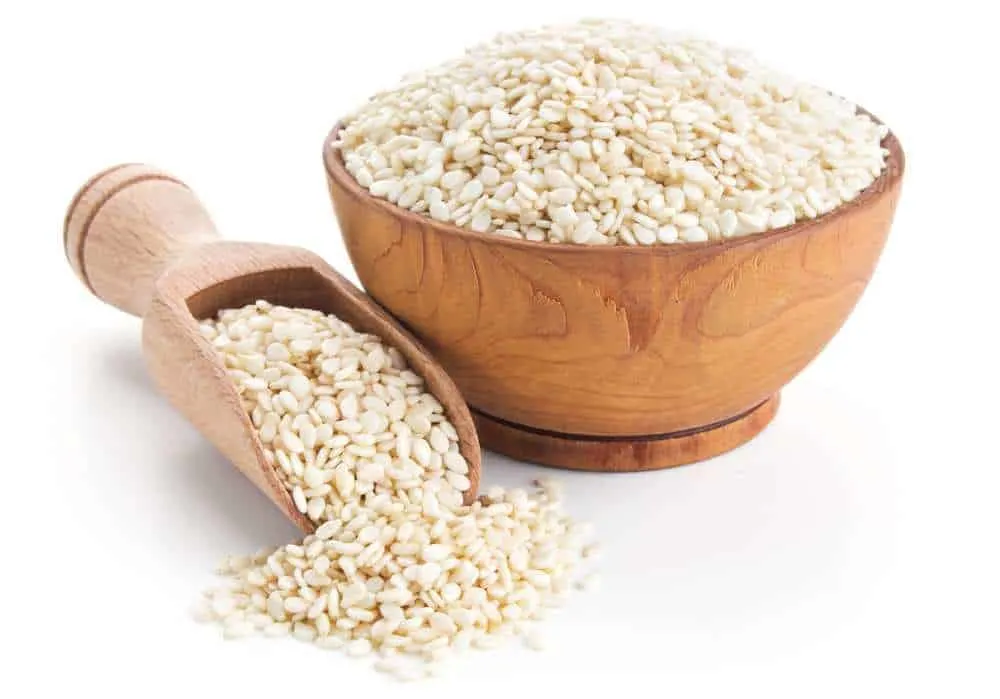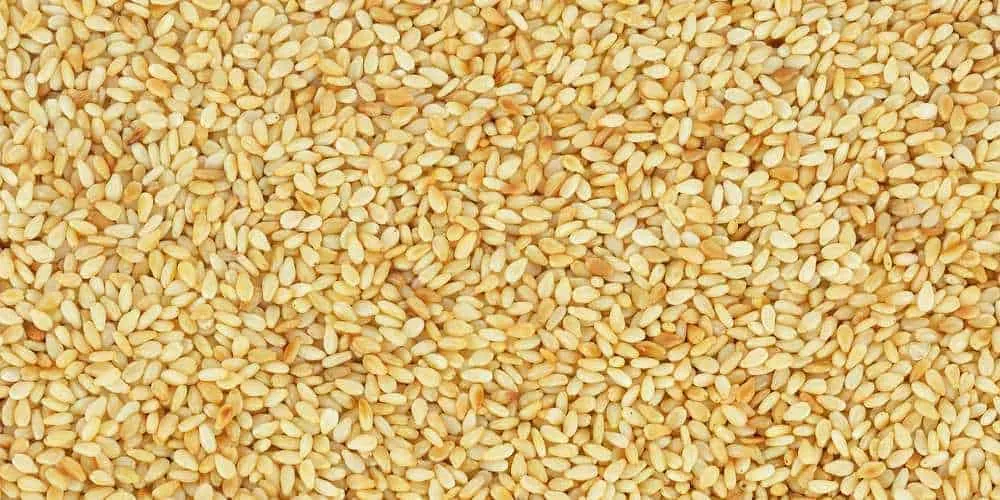Sesame seeds can be a great addition to many meals. They add a subtle, pleasant taste to any meal you’d like!
Who can even imagine buying a bagel without sesame seeds? Sure, bagels taste fine without them, but bagels are so, so much better with some seeds on top.
That’s not the only thing that’s great about sesame seeds. These magic seeds offer some great health benefits, too!
Since you learned about them, you looked into that, and it’s true. Some Asian cultures go as far as to make even a sesame paste which is also tasty!
Today, you brought some bagels back from the store. Your family was thrilled – even more so, your dog.
Many bagels disappeared within a few minutes, but there was one leftover – the one your dog wants. Sure, you give many things like treats, but the bagel has sesame seeds.
Can dogs eat sesame seeds? What will happen to your dog if it eats sesame seeds? Is there a way to prepare them? Read our article to find out!

Can Dogs Eat Sesame Seeds?
There are so many things to know once you get a dog as a pet. They have different dietary restrictions compared to humans.
So, it can be a little difficult to figure out what is safe for your pup and what isn’t. So, what about sesame seeds?
In reality, dogs can eat sesame seeds. It’s perfectly safe and even good for dogs to eat some sesame seeds from time to time!
There are a few things to keep in mind if you’re giving the dog sesame seeds. Number one, remember to introduce this food item first.
Introducing the food will let you know firsthand whether your dog is sensitive or even allergic to sesame seeds. Food allergies are real in dogs, as well.
Anyway, be careful whenever you’re giving the dog something new, including sesame seeds. If you notice the dog is acting unusual after eating these seeds, discontinue using them immediately!

Introducing Sesame Seeds To Your Dog’s Diet
Introducing a food item is a crucial, truly important method of adding new food items to your dog’s diet. It’s useful to introduce new foods for many reasons.
Number one would be because it’s safer to check for allergies when the dog has ingested a tiny quantity of the new food. If it was, let’s say, a full meal, it could be more dangerous and even lethal for the dog.
So, it’s not only safe, but it’s also a better way to add some new food. Dogs are likely to be put off by some new food – especially if the new food looks nothing like meat.
Dogs may be omnivores in nature, but they do need more meat than veggies in their diet. That’s why every commercial dog food contains so much more meat.
By using the introduction method for sesame, it’s almost guaranteed that the dog will have a great time eating sesame seeds. Be careful, nonetheless!
When you’re giving the seeds to your pet for the first time, add a pinch of seeds to their regular meal. Next time, add a little more, and next time after that, a little more than that.
Increase the dose until you reach a full allowed dose. Your dog will love it!

Serving Sesame Seeds To Your Pet
For so many foods, there are various rules when you’re serving it to your dog. Sesame seeds aren’t so complicated.
We’ll just talk about things to keep in mind. Since sesame seeds aren’t served on their own – they’re usually a part of some meal, you ought to be careful.
Meals for humans tend to be inadequate for pets. Human meals can contain herbs and spices that can upset your dog’s tummy or even be lethal to them.
Also, dogs require a low-sodium diet. Sodium shouldn’t be avoided at all times, but monitor your dog’s sodium intake if the dog has some medical conditions.
And one more thing – watch for meals that are rich in fats and oils. Fats and oils may be fine even for humans on restricted diets, but they’re not suitable for dogs.
Dogs can have trouble digesting fat-rich meals. Even more so, too much oil can cause an intestinal blockage!
So, all in all, it might be best to just add sesame seeds to their regular dog food. You won’t make a mistake by doing that!
Mix the sesame seeds in their food or sprinkle them on top. Either way, your dog will have a great time eating these tasty seeds!
Can Dogs Eat Sesame Butter Or Tahini?
Yes! Sesame butter and tahini (a sesame spread) can make a yummy treat for your furry baby. Since these foods contain a lot of fat, it may be best to stick to occasional use.
For example, if you’re looking to give your dog some meds (and we all know how tough it can be), it’s best if you hide it in some tahini. It works and we do it, too!
If you want the dog to eat butter or tahini as a treat, that’s fine, too. Just remember the 10% rule – treats should go over 10% of the daily calorie intake! Dogs should get the most of their calories from main meals, not treats.
Dosing Sesame Seeds For Your Dog
Dosing any food correctly is crucial in many ways. First, it makes sure you don’t go overboard – a dog’s tummy is more sensitive to large quantities of food than ours.
Also, too much of some food can cause obesity or diabetes. Nobody wants that for their beloved pet! So, let’s check out the allowed amount of sesame seeds based on dog size:
| Toy breeds | Small breeds | Medium breeds | Large breeds |
|---|---|---|---|
| Half a teaspoon | Teaspoon of sesame | Half a tablespoon of sesame seeds | Up to a tablespoon of sesame |
When we’re talking about how often should dogs eat sesame seeds, we’d say – not so often. Once a week or less is completely fine!

Benefits Of Dogs Eating Sesame Seeds
Sesame seeds can be a great treat for any dog because they have a lot of good nutrients. First, they’re great because of the fiber content.
Fiber content is important for dogs because it relieves constipation. If your dog experiences indigestion, the fiber in sesame can help relieve the symptoms.
Furthermore, sesame seeds have a good amount of calcium. Calcium keeps the bones healthy, and the copper in will help fight joint pain.
Antioxidants are especially important for any dog’s diet. Antioxidants protect the dog’s skin from dangerous free radicals. Therefore, antioxidants that exist in sesame seeds, too, will protect your furry baby from cancer.
Let’s check out the nutritional value of 1 tablespoon of sesame seeds:
| Calories | 52 kcal |
| Total fat | 4.5g |
| Sodium | 1mg |
| Potassium | 42.1mg |
| Calcium | 92mg |
| Total carbohydrate | 3g |
| Dietary fiber | 1g |
| Protein | 1.6g |
| Copper | 0.2g |

Eating Sesame Seeds – Hazards
Eating sesame seeds can be great for your pet, but it can pose some risks, too. We already talked about hypersensitivity and allergies, but is there something else?
Eating sesame seeds is not something your pet needs to live a happy life. It can have a benefit in their health, but it could be hazardous, too.
Eating the sesame seeds too often can lead to tummy woes such as diarrhea, vomiting, and go as far as bowel irritation. The fiber content can be great for some puppies, but it could be too much for pups with sensitive tummies.
All in all, just keep in mind that dogs can develop an allergy to sesame seeds if they cannot digest them properly. Watch their reaction from time to time, just to be safe.
If you see that the dog is acting lethargic or they don’t feel well after eating sesame seeds, visit the vet. It’s better to be safe than sorry!

Conclusion
To conclude, dogs can eat sesame seeds. These fabulous seeds can even make a good treat, but unfortunately, only an occasional one.
Sesame seeds are pretty high-calorie-wise, so it’s not the best idea ever to feed your dog sesame seeds daily. However, they can be enjoyed safely from time to time.
If you add it to meals, make sure those meals are free from salt, herbs, and spices. We would advise that you make meals for your pet separately from meals for your family!
Sesame seeds can help prevent cancer, they maintain good bone and joint health. Truly, an amazing seed!
Be careful about the dosage and frequency of use. Keep yourself and your furry pet safe!
Learn More: What Can Dogs Eat? A Comprehensive List Of Dog-safe Foods

